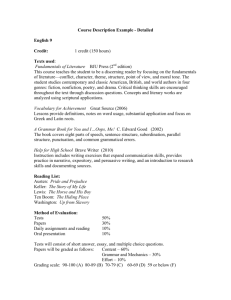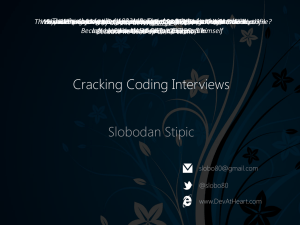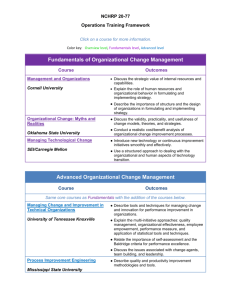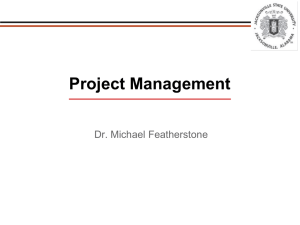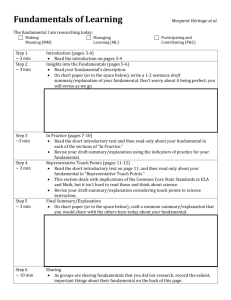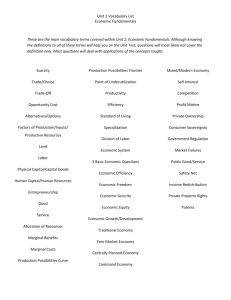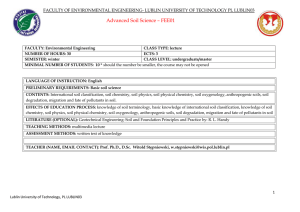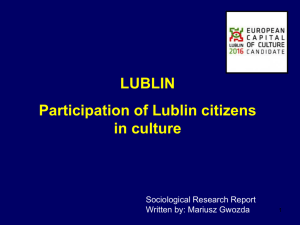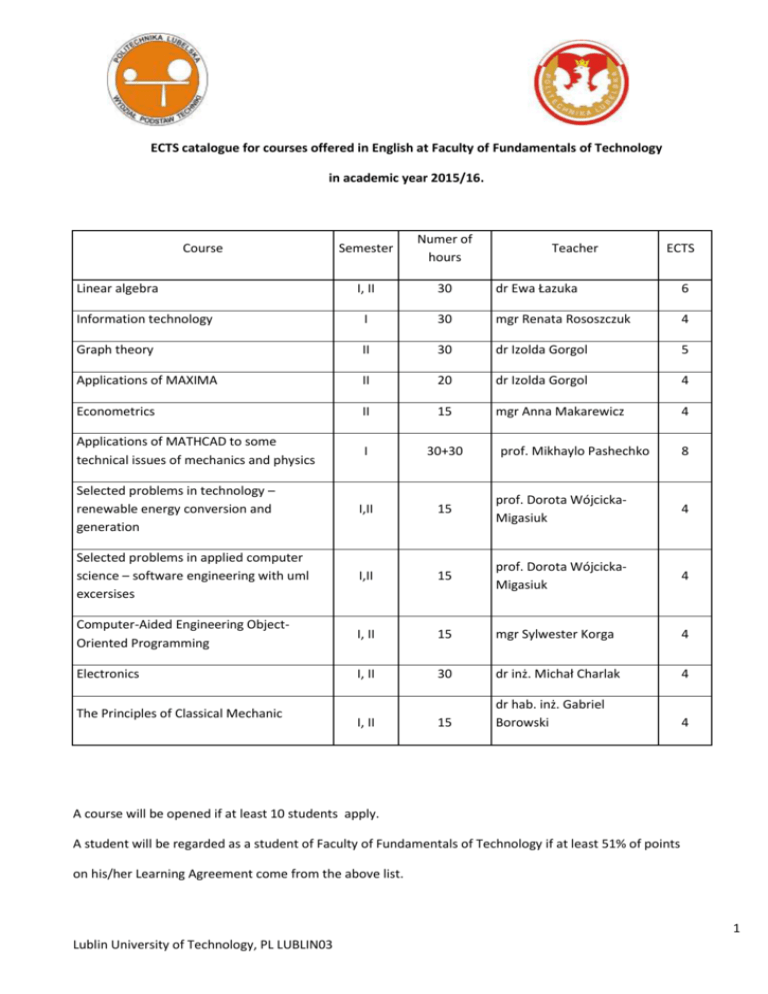
ECTS catalogue for courses offered in English at Faculty of Fundamentals of Technology
in academic year 2015/16.
Semester
Numer of
hours
I, II
30
dr Ewa Łazuka
6
Information technology
I
30
mgr Renata Rososzczuk
4
Graph theory
II
30
dr Izolda Gorgol
5
Applications of MAXIMA
II
20
dr Izolda Gorgol
4
Econometrics
II
15
mgr Anna Makarewicz
4
Applications of MATHCAD to some
technical issues of mechanics and physics
I
30+30
Selected problems in technology –
renewable energy conversion and
generation
I,II
15
prof. Dorota WójcickaMigasiuk
4
Selected problems in applied computer
science – software engineering with uml
excersises
I,II
15
prof. Dorota WójcickaMigasiuk
4
Computer-Aided Engineering ObjectOriented Programming
I, II
15
mgr Sylwester Korga
4
Electronics
I, II
30
dr inż. Michał Charlak
4
I, II
15
dr hab. inż. Gabriel
Borowski
4
Course
Linear algebra
The Principles of Classical Mechanic
Teacher
ECTS
prof. Mikhaylo Pashechko
8
A course will be opened if at least 10 students apply.
A student will be regarded as a student of Faculty of Fundamentals of Technology if at least 51% of points
on his/her Learning Agreement come from the above list.
1
Lublin University of Technology, PL LUBLIN03
FACULTY OF FUNDAMENTALS OF TECHNOLOGY - LUBLIN UNIVERSITY OF TECHNOLOGY PL LUBLIN03
Information Technology – MK_5e
FACULTY: Faculty of Fundamentals of Technology
NUMBER OF HOURS: 30
SEMESTER: I
MINIMAL NUMBER OF STUDENTS: 10
CLASS TYPE: laboratory
ECTS: 4
CLASS LEVEL: Bsc
LANGUAGE OF INSTRUCTION: English
PRELIMINARY REQUIREMENTS: basic knowledge of computer science
CONTENTS: generating text documents (a basic structure of a source file, fundamentals of coding formulas, defining new commands) and creating a
multimedia presentation in the Latex system
EFFECTS OF EDUCATION PROCESS: understanding the basic question of programming in the Latex system, creating documents and multimedia
presentations according to principles of the Latex system
LITERATURE (OPTIONAL): Leslie Lamport, A document preparation system - LATEX. User's guide and reference manual.
TEACHING METHODS: working with educational documents prepared for laboratories, analysing theoretical and practical questions related to the
Latex system
ASSESSMENT METHODS: final test verifying a working knowledge of basic commands in the Latex system, grade for the multimedia presentation
prepared in class.
TEACHER (NAME, EMAIL CONTACT): Renata Rososzczuk, r.rososzczuk@pollub.pl
2
Lublin University of Technology, PL LUBLIN03
FACULTY OF FUNDAMENTALS OF TECHNOLOGY - LUBLIN UNIVERSITY OF TECHNOLOGY PL LUBLIN03
Linear Algebra MK_3e
FACULTY: Faculty of Fundamentals of Technology
NUMBER OF HOURS: 30
SEMESTER: I, II
MINIMAL NUMBER OF STUDENTS: 10
CLASS TYPE: lecture + class
ECTS: 6
CLASS LEVEL: Bsc
LANGUAGE OF INSTRUCTION: English
PRELIMINARY REQUIREMENTS: basic mathematical concepts and notations;
CONTENTS: algebraic structures; complex numbers; matrix algebra; determinants; systems of linear equations; vector spaces, subspaces, linear
independence, basis and dimension; linear transformations; eigenvectors and eigenvalues; diagonalization
EFFECTS OF EDUCATION PROCESS: the students will be able to apply the concepts and methods described in the syllabus and will be able to solve
different mathematical problems using linear algebra
LITERATURE (OPTIONAL):
1. S. J. Axler, Linear Algebra Done Right, Springer-Verlag.
2. D. H. Griffel, Linear Algebra and Its Applications, Chichester: Ellis Horwood Limited.
3. D. C. Lay, Linear Algebra and Its Applications, Addison Wesley.
4. S. J. Leon, Linear Algebra with Applications, Pearson Prentice Hall.
5. D. Poole, Linear Algebra: A Modern Introduction, Brooks/Cole.
TEACHING METHODS: lecture, practical exercises during classes
ASSESSMENT METHODS: written tests during classes, written exam
TEACHER (NAME, EMAIL CONTACT): Ewa Łazuka, e.lazuka@pollub.pl
3
Lublin University of Technology, PL LUBLIN03
FACULTY OF FUNDAMENTALS OF TECHNOLOGY - LUBLIN UNIVERSITY OF TECHNOLOGY PL LUBLIN03
Econometrics – MK_41e
FACULTY: Faculty of Fundamentals of Technology
NUMBER OF HOURS: 15
SEMESTER: II
MINIMAL NUMBER OF STUDENTS: 10
CLASS TYPE: Mathematical class
ECTS: 4
CLASS LEVEL: Bsc
LANGUAGE OF INSTRUCTION: English.
PRELIMINARY REQUIREMENTS: matrix analysis, matric equation;
CONTENTS: 1. Pointwise and periodical prognosis 2. Temporary series 3. Estimation of linear and nonlinear models parameters.
EFFECTS OF EDUCATION PROCESS: Understanding the method of least squares, Hellwig’s method, calculating of correlation coefficient.
LITERATURE (OPTIONAL): „A Guide to Econometrics” Peter Kennedy, „Econometrics” Fumio Hayashi, Princeton University Press, „Introduction to
Econometrics” Christopher Dougherty.
TEACHING METHODS: Working on computers, lecture of theory, practical exercises.
ASSESSMENT METHODS: Examination.
TEACHER (NAME, EMAIL CONTACT): Anna Makarewicz a.makarewicz@pollub.pl
4
Lublin University of Technology, PL LUBLIN03
FACULTY OF FUNDAMENTALS OF TECHNOLOGY - LUBLIN UNIVERSITY OF TECHNOLOGY PL LUBLIN03
Graph Theory - MK_14e
FACULTY: Faculty of Fundamentals of Technology
NUMBER OF HOURS: 30
SEMESTER: II
MINIMAL NUMBER OF STUDENTS: 10
CLASS TYPE: lecture + auditorials
ECTS: 5
CLASS LEVEL: Bsc
LANGUAGE OF INSTRUCTION: English
PRELIMINARY REQUIREMENTS: course will be opened if at least 10 students apply
CONTENTS: fundamentals of graph theory: connectivity, trees, minimal spanning trees, shortest paths, Euler and Hamilton cycles, planarity, colorings
EFFECTS OF EDUCATION PROCESS: recognizing basic properties of graphs, constructing minimal spanning trees and shortest paths, recognizing planar
graphs, ability of applying vertex and edge colorings of graphs
LITERATURE (OPTIONAL): G. Chartrand, L. Lesniak, P. Zhang, Graphs and digraphs, CRC, 2011
TEACHING METHODS: lecture, solving exercises
ASSESSMENT METHODS: written exam
TEACHER (NAME, EMAIL CONTACT): Izolda Gorgol, i.gorgol@pollub.pl
5
Lublin University of Technology, PL LUBLIN03
FACULTY OF FUNDAMENTALS OF TECHNOLOGY - LUBLIN UNIVERSITY OF TECHNOLOGY PL LUBLIN03
Computer-Aided Engineering Object-Oriented Programming
FACULTY: Faculty of Fundamentals of Technology
NUMBER OF HOURS: 15
SEMESTER: I, II
MINIMAL NUMBER OF STUDENTS: 10
CLASS TYPE: tutorial
ECTS: 4
CLASS LEVEL: BSc
LANGUAGE OF INSTRUCTION: english
PRELIMINARY REQUIREMENTS: course will be opened if at least 10 students apply
CONTENTS:
Environment Basics– learn the most important building blocks for any Labview application, including the front panel, block diagram, palettes, controls,
and indicators.
Graphical Programming Basic – see how to connect functions and work with a variety of datatypes when constructing applications.
Commont Tools – view a collection of important tools and common user functions that all users should be familiar with.
Debugging Tools – learn how to use simple tools and techniques to understand the behavior of code and address problems or bugs
EFFECTS OF EDUCATION PROCESS: ability to create programs for engineers
LITERATURE (OPTIONAL): www.ni.com
TEACHING METHODS: computer lab and exercise
ASSESSMENT METHODS: assessment for the project-execution of engineering program
TEACHER (NAME, EMAIL CONTACT): Sylwester Korga, s.korga@pollub.pl
6
Lublin University of Technology, PL LUBLIN03
FACULTY OF FUNDAMENTALS OF TECHNOLOGY - LUBLIN UNIVERSITY OF TECHNOLOGY PL LUBLIN03
Selected problems in technology – renewable energy conversion and generation
FACULTY: Faculty of Fundamentals of Technology
NUMBER OF HOURS: 15
SEMESTER:I, II
MINIMAL NUMBER OF STUDENTS: 10
CLASS TYPE: tutorial
ECTS: 4
CLASS LEVEL: MSc
LANGUAGE OF INSTRUCTION: English
PRELIMINARY REQUIREMENTS:
CONTENTS: Renewable energy sources.
Thermal collectors, photovoltaic cells and systems. Wind power generation. Biofuels and combustion. Geothermal energy systems and their examples
of realization. Ground collectors and heat pumps. Fuel cells
EFFECTS OF EDUCATION PROCESS: Students can apply freeware CAD software to design an integrated system to supply energy
LITERATURE (OPTIONAL): Encyclopedia of Energy. full text access http://www.sciencedirect.com
Encyclopedia of energy / edit. in chief: Cutler J. Cleveland.[Amsterdam] : Elsevier, [cop.] 2008
Duffie J.A., Beckman J.A., 1991 Solar Engineering of Thermal Processes. John Wiley
and Sons, New York
TEACHING METHODS: tutorial in computer lab.
ASSESSMENT METHODS: computer exercise evaluation, class test
TEACHER (NAME, EMAIL CONTACT): Prof. Dorota Wójcicka-Migasiuk
7
Lublin University of Technology, PL LUBLIN03
FACULTY OF FUNDAMENTALS OF TECHNOLOGY - LUBLIN UNIVERSITY OF TECHNOLOGY PL LUBLIN03
Selected problems in applied computer science – software engineering with uml excercises
FACULTY: Faculty of Fundamentals of Technology
NUMBER OF HOURS: 15
SEMESTER: I,II
MINIMAL NUMBER OF STUDENTS: 10
CLASS TYPE: tutorial
ECTS: 4
CLASS LEVEL: BSc
LANGUAGE OF INSTRUCTION: English
PRELIMINARY REQUIREMENTS:
CONTENTS: Heat and mass transfer. Heat generation, combustion processes, fuels, boilers. Electric current and its energy. Conversion from
mechanical energy to electric current. Conversion from heat to electric energy. Cogeneration of heat and current. Conversion from light to electric
current. Conversion from light to heat. Fuel cells and unconventional energy sources
EFFECTS OF EDUCATION PROCESS: Students can apply freeware CAD software to solve simple energy generation problems
LITERATURE (OPTIONAL): Encyclopedia of Energy. full text access http://www.sciencedirect.com
Encyclopedia of energy / edit. in chief: Cutler J. Cleveland. {Amsterdam] : Elsevier, [cop.] 2008
Encyclopedia of energy engineering and technology. Vol. 1-3 / ed. by Barney L. Capehart.
Boca Raton [etc.] : CRC Press Taylor & Group, cop. 2007
TEACHING METHODS: tutorial in computer lab.
ASSESSMENT METHODS: computer exercise evaluation, class test
TEACHER (NAME, EMAIL CONTACT): Prof. Dorota Wójcicka-Migasiuk
8
Lublin University of Technology, PL LUBLIN03
FACULTY OF FUNDAMENTALS OF TECHNOLOGY - LUBLIN UNIVERSITY OF TECHNOLOGY PL LUBLIN03
Electronics
FACULTY: Faculty of Fundamentals of Technology
NUMBER OF HOURS: 30
SEMESTER: I, II
MINIMAL NUMBER OF STUDENTS: 10
CLASS TYPE: tutorial
ECTS: 4
CLASS LEVEL: BSc
LANGUAGE OF INSTRUCTION: English
PRELIMINARY REQUIREMENTS:
CONTENTS:
Semiconductors: diode, bipolar transistor, operational amplifier. Rectifier. AC/DC Power Adapter. Power amplifier. Function generator. Logic gates, flipflops. Microprocessor architecture.
EFFECTS OF EDUCATION PROCESS: Students can apply fundamental electrical circuit’s laws to design and measure simply electronic device
LITERATURE (OPTIONAL): Kuphaldt T.R., 2009 Lessons In Electric Circuits. Volume III – Semiconductors. full text access
http://openbookproject.net/electricCircuits/
TEACHING METHODS: tutorial in lab.
ASSESSMENT METHODS: exercise evaluation, class test
TEACHER (NAME, EMAIL CONTACT): PhD Eng. Michał Charlak
9
Lublin University of Technology, PL LUBLIN03
FACULTY OF FUNDAMENTALS OF TECHNOLOGY - LUBLIN UNIVERSITY OF TECHNOLOGY PL LUBLIN03
The Principles of Classical Mechanic
FACULTY: Faculty of Fundamentals of Technology
NUMBER OF HOURS: 15
SEMESTER: I, II
MINIMAL NUMBER OF STUDENTS: 10
CLASS TYPE: tutorial
ECTS: 4
CLASS LEVEL: BSc
LANGUAGE OF INSTRUCTION: English
PRELIMINARY REQUIREMENTS:
CONTENTS: The aim of this course is to introduce general methods of studying the dynamics of systems, through which students can
acquire experience in using mathematical techniques for solving practical problems.
The principles and applications of classical mechanics, including harmonic motion and physical systems; emphasis on problem solving.
Basic laboratory experiments supporting theoretical principles presented in lecture involving the principles and applications of
classical mechanics, including harmonic motion and physical systems; experimental design, data collection and analysis, and
preparation of laboratory reports.
EFFECTS OF EDUCATION PROCESS: Students can apply a methodology for solving estimation problems, In particular: be able identify a set of
quantities that can be estimated or calculated, be able to identify an approximate or exact relationship between these quantities and the quantity to
be estimated in the problem.
LITERATURE (OPTIONAL): Abraham R., Foundations of mechanics, Benjamin/Cummings Publishing, 1985 .
TEACHING METHODS: tutorial in lab.
ASSESSMENT METHODS: exercise evaluation, class test
TEACHER (NAME, EMAIL CONTACT): Gabriel Borowski, g.borowski@pollub.pl
10
Lublin University of Technology, PL LUBLIN03
FACULTY OF FUNDAMENTALS OF TECHNOLOGY - LUBLIN UNIVERSITY OF TECHNOLOGY PL LUBLIN03
Applications of MAXIMA
FACULTY: Faculty of Fundamentals of Technology
NUMBER OF HOURS: 20
SEMESTER: II
MINIMAL NUMBER OF STUDENTS: 10
CLASS TYPE: laboratory
ECTS: 4
CLASS LEVEL: Bsc
LANGUAGE OF INSTRUCTION: English
PRELIMINARY REQUIREMENTS: none
CONTENTS: MAXIMA in solving linear and nonlinear equations, differentiating and integrating; 2D and 3D plots
EFFECTS OF EDUCATION PROCESS: student will be able to apply MAXIMA to solve basic exercises from differential and integral calculus
LITERATURE (OPTIONAL):
TEACHING METHODS: tutorial in lab
ASSESSMENT METHODS: project
TEACHER (NAME, EMAIL CONTACT): Izolda Gorgol, i.gorgol@pollub.pl
11
Lublin University of Technology, PL LUBLIN03
FACULTY OF FUNDAMENTALS OF TECHNOLOGY - LUBLIN UNIVERSITY OF TECHNOLOGY PL LUBLIN03
Applications of MATHCAD to some technical issues of mechanics and physics
FACULTY: Faculty of Fundamentals of Technology
NUMBER OF HOURS: 30+30
SEMESTER: I
MINIMAL NUMBER OF STUDENTS: 10
CLASS TYPE: lecture+ laboratory
ECTS: 8
CLASS LEVEL: Bsc/Msc
LANGUAGE OF INSTRUCTION: English
PRELIMINARY REQUIREMENTS: calculus, basic physics
CONTENTS: atrix calculations, plotting, solving system of equations, differential and integral calculus, limits, technical mechanics and physics,
kinematics, dynamics
EFFECTS OF EDUCATION PROCESS: student will be able to apply MATHCAD to solve some technical problems from mechanics or physics
LITERATURE (OPTIONAL):
TEACHING METHODS: lecture+ laboratory
ASSESSMENT METHODS: project
TEACHER (NAME, EMAIL CONTACT): Mykhaylo Pashechko, mpashechko@hotmail.com
12
Lublin University of Technology, PL LUBLIN03



